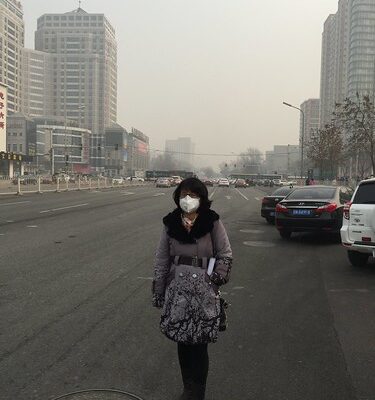Auburn University and Massachusetts Institute of Technology climate scientists are part of an international research team that has linked significant decreases in China’s crop production to increased levels of tropospheric ozone as a result of rapid urbanization and industrialization. It’s a trend that’s raising serious concerns about food supply security in China.
The team’s findings will be published in the article, “Climate extremes and ozone pollution: A growing threat to China’s food security,” in the January issue of Ecosystem Health and Sustainability, a joint journal of the Ecological Society of America and Ecological Society of China.
“The results highlight the fact that climate change is already affecting crop yields in China, and that yield losses are compounded through interactions of climate and other environmental stresses such as tropospheric ozone,” said study co-author John Reilly, co-director of the MIT Joint Program on the Science and Policy of Global Change.
Over the past three decades, China has become the world’s largest producer and consumer of agricultural products. Given its status as the world’s most populous country and second largest economy, how China addresses the multitude of factors impacting its crop production and food security is of global concern.
“Actions to reduce ozone pollution and combat climate change and associated extreme weather will enhance China’s food security,” said Jerry Melillo, a member of National Academy of Sciences and Distinguished Scientist in the Ecosystem Center of Marine Biological Laboratory, Woods Hole.
Unlike the majority of existing assessments, the study is unique because it focuses on increasing climate extremes such as drought and its correlation with tropospheric ozone, rather than climate variables such as temperature and precipitation.
The results of the study, which used an integrated approach combining agricultural ecosystem modeling with ground and satellite observations, may strongly influence climate change policy and approaches to addressing global food security.
“Reducing air pollution would be an efficient way to stabilize food security in the face of future climate change in China,” said the study’s lead author Hanqin Tian, Auburn University professor and director of the International Center for Climate and Global Change Research. “Improving air quality should be a core component of climate adaptation strategies in China.”
“This study is not only significant for China to address these environmental challenges, but also raises the issue for other crop-growing countries to take actions in maintaining or enhancing food security,” said Yonglong Lu, past president of the Scientific Committee on Problems of the Environment, a fellow of The World Academy of Science, and editor-in-chief of Ecosystem Health and Sustainability.
To read the article in Ecosystem Health and Sustainability, visit http://www.esajournals.org/loi/ehas.
To learn more, visit the International Center for Climate and Global Change Research at http://wp.auburn.edu/cgc/ or the MIT Joint Program on the Science and Policy of Global Change at http://globalchange.mit.edu/.\
Originally published January 22nd, 2016.
(Written by Jamie Anderson)










